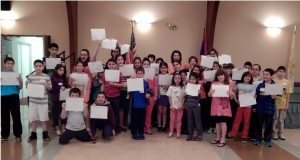PROVIDENCE, R.I.—During the month of April, the Rhode Island (RI) branch of the Genocide Education Project participated in several events of significance. Co-chairs Pauline Getzoyan and Esther Kalajian were honored to be a part of the National History Day in Rhode Island, as well as in Armenian Youth Day, for the first time this year. They also presented the Genocide Educator of the Year Award 2014 at the Armenian Martyrs’ Memorial Committee of RI commemorative.

National History Day in RI is presented annually by the Graduate Program in History at Providence College and the RI Social Studies Association. This year, Getzoyan and Kalajian were invited to participate as independent judges of those projects based on the subject of genocide. The theme of National History Day 2014 was “Rights and Responsibilities in History,” which lent itself to the study of genocide throughout history. After viewing 12 exhibits, documentaries, and websites based on the theme and subject of genocide, 2 clear winners emerged on judging day, April 5. As independent judges, Getzoyan and Kalajian voted to award two prizes, instead of the one originally planned: one for a junior division entry (middle school) and one for a senior division entry (high school). Both entries were extremely well done.
The junior division winner was Kristina Davtian, an eighth grade student at St. Peter School in Warwick, whose project was a website entitled, “Immigration: Rights and Responsibilities.” Davtian’s website clearly outlined immigration as it pertained to human rights violations and times of war, and included an entire section on the Armenian Genocide and how it impacted immigration to the United States. The senior division winner was Amanda Carberry, a ninth grade student at Narragansett High School in Narragansett. Carberry’s project was an outstanding documentary entitled, “Exterminate the Cockroaches: The Rwandan Genocide and the Responsibility to Protect.” On the occasion of the 20th anniversary of the beginning of the Rwandan Genocide, Carberry’s project was both timely and effective. Getzoyan and Kalajian presented the winners with their awards, which included an autographed copy of Chris Bohjalian’s The Sandcastle Girls and $50 cash, at the award ceremony on Mon., April 7, at Winman Jr. High School in Warwick.

As the month progressed, Getzoyan and Kalajian were asked by the Armenian Martyrs’ Memorial Committee of RI to conduct a presentation with the young students at Armenian Youth Day on Tues., April 22 on the subject of genocide, primarily the meaning of the word “genocide.” Given the age span of 7-14, Getzoyan and Kalajian were faced with the dilemma of how to address this topic in an interesting and active fashion with all the students. Ultimately, the approach focused on the definition of genocide, as well as some of the stages of genocide and their relation not only to the students’ everyday experiences, but also the Armenian Genocide. Getzoyan and Kalajian discussed classification, the issue of identity, and the idea of “us vs. them.”
The students filled out identity charts with their names and interests, which they then shared with each other to understand the concept of how they may be viewed by others versus how they see themselves. This led to the second stage of genocide—symbolization—which included showing the students images of different symbols, such as sports logos, fraternity letters, and finally swastikas, the yellow Star of David, and gang graffiti. The students clearly understood the difference between the symbols and what they meant, especially since some of them had siblings who were in fraternities and some were wearing sports logos.
An activity that drove the point of the fifth stage of genocide—polarization—home to the students included randomly passing out blue and green paint chips. After passing out the chips, Getzoyan and Kalajian began a casual conversation about blue being their favorite color. They then had the students with the blue chips come up since they had the favorite color and had them all partake of a donut snack. After all the “blue” students took their snacks, the “green” students were asked how they felt about being excluded. This activity clearly demonstrated the feeling of polarization, which some of the students had experienced through bullying themselves. This led to a related discussion of bullying and how to react when being bullied or witnessing bullying. Of course, all the students were given the snacks at the end of this activity.
To conclude the presentation, Getzoyan and Kalajian introduced the final stage of genocide, denial, in relation to taking responsibility for one’s actions, and leading to being upstanders versus bystanders. The students were fully engaged in the presentation and happily posed for a picture with their teachers.
To conclude the month, the RI Branch of the Genocide Education Project once again presented the Genocide Educator of the Year Award during the commemorative program held on Sun., April 27, by the Armenian Martyrs’ Memorial Committee (AMMC) of RI at the monument at North Burial Ground in Providence. The award, which includes a framed certificate along with a $500 stipend, is made possible through the generosity of the AMMC and the Armenian National Committee (ANC) of RI. This year’s recipient was Lisa DerManouelian, a teacher of literature and religion at St. Peter School in Warwick. DerManouelian was selected for several reasons, the most important being her ability and motivation to include genocide education in her curriculum, even though she is not a social studies or history teacher. And she does this as a teacher at the middle school level with grades six through eight. In fact, DerManouelian is the first middle school teacher to receive this award since its inception seven years ago. According to Joan Sickinger, the principal of St. Peter School, DerManouelian is very technology-oriented and has brought many technological advances to the school. Along these lines, Sickinger shared that not only does DerManouelian freely share her knowledge of technology with both students and faculty, but two of her students were winners this year for their websites at the Rhode Island History Day event, and they will be travelling to the National History Day event in Washington, D.C.
Recently, Middle School students went to see “The Diary of Anne Frank”at Ocean State Theatre Company in Warwick, thus continuing their genocide education experience. As part of her curriculum this year, DerManouelian has incorporated the Armenian Genocide and is having her eighth grade students read and study The Road from Home by David Kherdian. DerManouelian is always eager to learn more about her subject areas and technology, and attends many workshops to this end. With that in mind, another reason for her selection is her efforts at spreading the word about genocide education and the Genocide Education Project RI Branch amongst her colleagues. It was through her introduction to the RI History Day coordinators that Kalajian and Getzoyan were able to participate and offer awards to the outstanding students. DerManouelian graciously accepted the award following Getzoyan’s introduction and presentation.



Great contribution to humanity building…
Pauline and Esther are inspirational in their achievement and their commitment.